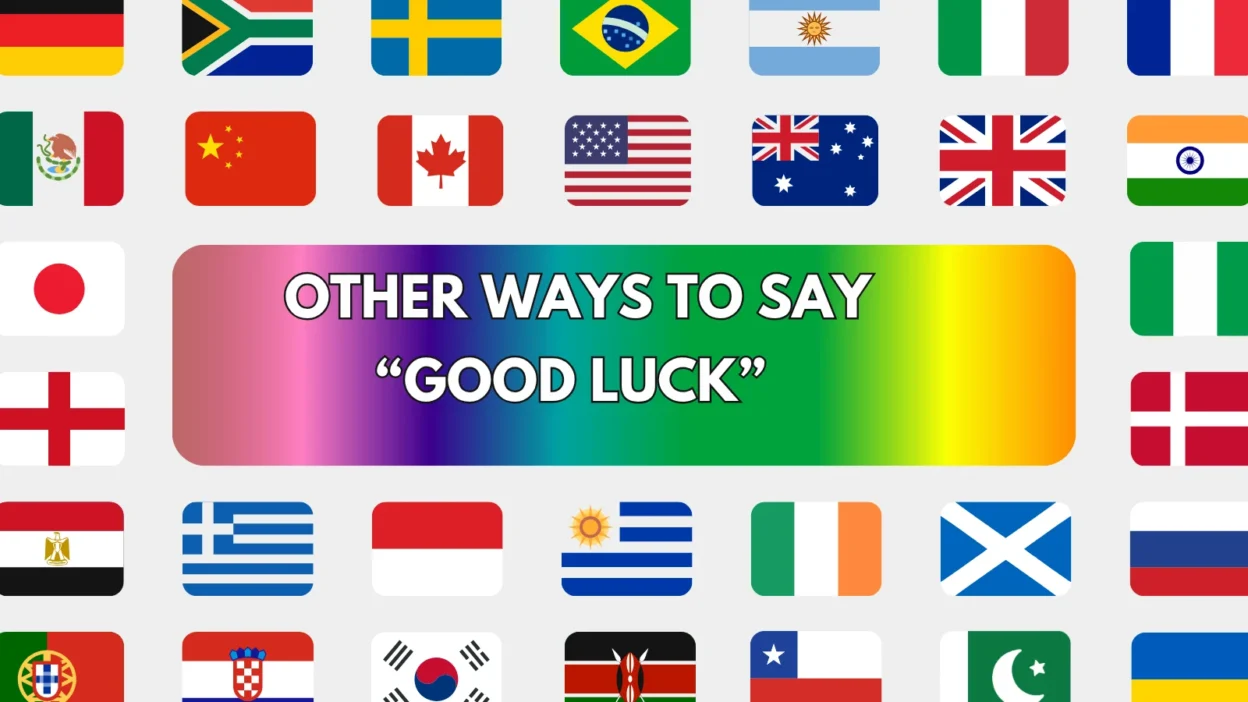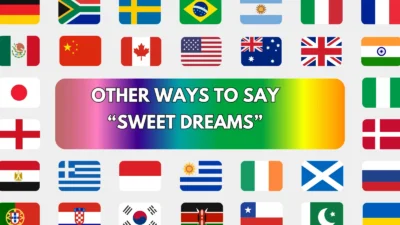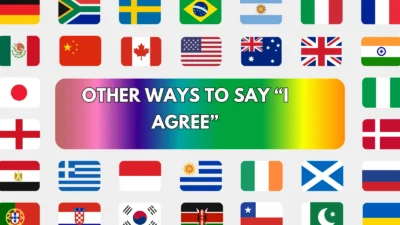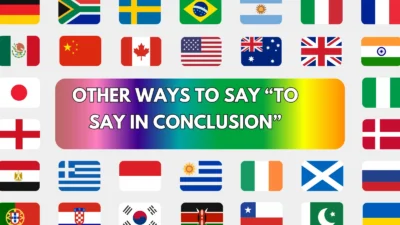Wishing someone “good luck” is a thoughtful and supportive gesture — especially in a professional setting. However, the casual tone of “good luck” isn’t always the right fit in formal environments like emails, job interviews, or workplace conversations.
To help you communicate encouragement with clarity and professionalism, here are 25 polished alternatives to say “good luck” in a more refined and workplace-appropriate way.
1. Wishing you all the best
Meaning:
Expresses hope that everything goes well for someone.
Detailed Explanation:
This is one of the most versatile professional alternatives. It’s kind, respectful, and suitable for almost any formal or semi-formal situation.
Scenario Example:
Wishing you all the best in your new role at the firm.
Best Use:
Emails, farewell notes, job transitions.
Tone:
Warm, professional.
2. Best of luck in your endeavors
Meaning:
Wishes success in someone’s upcoming efforts or journey.
Detailed Explanation:
Slightly more formal, this phrase adds a sense of purpose and ambition to your well wishes.
Scenario Example:
Best of luck in your endeavors as you take on this new leadership position.
Best Use:
Farewell messages, career changes, LinkedIn posts.
Tone:
Professional, sincere.
3. Wishing you success
Meaning:
Hopes that the person achieves positive results in what they’re doing.
Detailed Explanation:
Simple and to the point, this phrase keeps the focus on achieving goals — ideal for business contexts.
Scenario Example:
Wishing you success with the product launch next week.
Best Use:
Emails, project communications, business support.
Tone:
Encouraging, formal.
4. I hope it goes well
Meaning:
Expresses hope that things turn out positively.
Detailed Explanation:
This phrase sounds natural while maintaining a professional tone, especially when talking about meetings or presentations.
Scenario Example:
I hope it goes well with the client demo today.
Best Use:
Casual conversations, quick messages.
Tone:
Supportive, polite.
5. I’ll be rooting for you
Meaning:
Shows support and encouragement for someone’s efforts.
Detailed Explanation:
Although informal, it can still be appropriate in friendly professional relationships.
Scenario Example:
I’ll be rooting for you during your presentation at the summit.
Best Use:
Team chats, close professional connections.
Tone:
Warm, friendly.
6. You’ve got this
Meaning:
Expresses confidence in someone’s abilities.
Detailed Explanation:
Motivational and upbeat, best used in encouraging peers or colleagues in a casual setting.
Scenario Example:
Big pitch today? You’ve got this!
Best Use:
Slack, internal team encouragement.
Tone:
Positive, informal.
7. All the best with [specific task]
Meaning:
Wishes success for a particular event or responsibility.
Detailed Explanation:
Directs the encouragement toward a specific effort, making it feel more personal and intentional.
Scenario Example:
All the best with your performance review today.
Best Use:
Emails, one-on-one communication.
Tone:
Professional, thoughtful.
8. Fingers crossed for you
Meaning:
Casually expresses hope that something turns out well.
Detailed Explanation:
Light and friendly — best suited to informal workplace communication.
Scenario Example:
Fingers crossed for you on the grant proposal outcome!
Best Use:
Team messages, peer support.
Tone:
Friendly, informal.
9. Hope everything goes smoothly
Meaning:
Wishes that there are no issues or complications.
Detailed Explanation:
Focused on smooth progress, this is great for professional environments, especially for processes or events.
Scenario Example:
Hope everything goes smoothly during your onboarding.
Best Use:
Project updates, transition periods.
Tone:
Calm, professional.
10. I’m confident you’ll do great
Meaning:
Shows belief in someone’s ability to perform well.
Detailed Explanation:
This version not only wishes success but also adds a personal vote of confidence.
Scenario Example:
I’m confident you’ll do great in your new leadership role.
Best Use:
Mentorship, team encouragement.
Tone:
Motivational, reassuring.
11. You’ll do wonderfully
Meaning:
Expresses belief in someone’s successful performance.
Detailed Explanation:
A bit softer and more personal, suitable when showing genuine care.
Scenario Example:
You’ll do wonderfully at the conference presentation.
Best Use:
Supportive team culture, personal notes.
Tone:
Encouraging, warm.
12. Sending my best wishes
Meaning:
Conveys hope for success and good outcomes.
Detailed Explanation:
A polished, professional phrase used in formal emails or farewell messages.
Scenario Example:
Sending my best wishes for your new venture in consulting.
Best Use:
Emails, formal goodbyes.
Tone:
Polite, professional.
13. Good wishes for your continued success
Meaning:
Expresses hope that the person keeps achieving success.
Detailed Explanation:
This phrase acknowledges someone’s past efforts while wishing them even more success.
Scenario Example:
Good wishes for your continued success in the new region.
Best Use:
Client farewells, executive communication.
Tone:
Elegant, respectful.
14. Here’s to your success
Meaning:
A celebratory expression of encouragement.
Detailed Explanation:
Warm and cheerful, good for expressing enthusiasm and support.
Scenario Example:
Here’s to your success on the big rollout tomorrow!
Best Use:
Celebratory notes, team morale boosters.
Tone:
Upbeat, positive.
15. May your efforts bear fruit
Meaning:
Hopes that someone’s hard work leads to success.
Detailed Explanation:
A bit poetic and thoughtful — good for formal, respectful communications.
Scenario Example:
May your efforts bear fruit as you lead this exciting new project.
Best Use:
Letters, formal emails.
Tone:
Professional, elegant.
16. Stay confident — you’ve prepared well
Meaning:
Encourages calmness and confidence before a challenge.
Detailed Explanation:
Goes beyond a basic good luck wish by validating their preparation.
Scenario Example:
Stay confident — you’ve prepared well for this interview.
Best Use:
One-on-one mentoring, professional coaching.
Tone:
Supportive, motivational.
17. I trust it will go well
Meaning:
Shows confidence in the outcome of someone’s effort.
Detailed Explanation:
Professional and calm, it reassures the other person while keeping things composed.
Scenario Example:
I trust it will go well with your investor presentation tomorrow.
Best Use:
Formal conversations, leadership tone.
Tone:
Confident, composed.
18. Looking forward to hearing great news
Meaning:
Expresses expectation for a positive outcome.
Detailed Explanation:
A forward-looking way to show optimism for someone’s success.
Scenario Example:
Looking forward to hearing great news from your pitch meeting.
Best Use:
Follow-up messages, emails of encouragement.
Tone:
Encouraging, positive.
19. Knock it out of the park
Meaning:
A playful way of saying “do an amazing job.”
Detailed Explanation:
Used informally, it expresses strong confidence and support.
Scenario Example:
You’ve practiced hard — go knock it out of the park!
Best Use:
Team culture, casual professional settings.
Tone:
Fun, energetic.
20. Break a leg
Meaning:
A traditional saying to wish good luck, especially in performances.
Detailed Explanation:
Best used in creative or entertainment industries — can feel quirky but still professional in the right setting.
Scenario Example:
Break a leg at the product demo tomorrow!
Best Use:
Creative fields, media, performances.
Tone:
Playful, creative.
21. Wishing you a strong start
Meaning:
Encourages success in the beginning stages of a task or role.
Detailed Explanation:
Acknowledges that beginnings are important, and you’re cheering them on.
Scenario Example:
Wishing you a strong start in your first week at the new company.
Best Use:
Onboarding, career transitions.
Tone:
Positive, encouraging.
22. Here’s to great results
Meaning:
Cheers to the hope of a successful outcome.
Detailed Explanation:
Used to express positivity and belief in a positive result.
Scenario Example:
Here’s to great results from all your hard work!
Best Use:
Celebrations, end-of-project notes.
Tone:
Positive, congratulatory.
23. Hoping for a successful outcome
Meaning:
Wishes that things go the way the person wants.
Detailed Explanation:
Sincere and optimistic — a gentle way to say “good luck” with a mature tone.
Scenario Example:
Hoping for a successful outcome from the meeting with investors.
Best Use:
Professional follow-ups, business communication.
Tone:
Respectful, formal.
24. Cheering you on from here
Meaning:
Shows remote or silent support from a distance.
Detailed Explanation:
This phrase is warm and supportive, especially for remote teams or virtual work.
Scenario Example:
Cheering you on from here — I know you’ll do great.
Best Use:
Remote work settings, Slack messages.
Tone:
Friendly, encouraging.
25. You’re more than ready
Meaning:
Reinforces someone’s readiness and preparation.
Detailed Explanation:
This goes beyond encouragement by affirming that the person is fully capable.
Scenario Example:
You’re more than ready — good luck out there today!
Best Use:
Motivational feedback, team support.
Tone:
Empowering, confident.
Conclusion
In professional settings, “Good luck” can sound too casual or overused. With these 25 polished alternatives, you can offer encouragement that suits any tone — whether you’re mentoring a colleague, sending off a team, or congratulating a client.

Robat Hood is a creative writer and contributor at Saypadia, focused on explaining trending words, slang, and cultural phrases in a simple and engaging way. With a sharp eye for modern language trends, Robat aims to make Saypadia a trusted place for understanding how words are used online and in daily conversations. His content is informative, approachable, and designed for readers of all levels.




